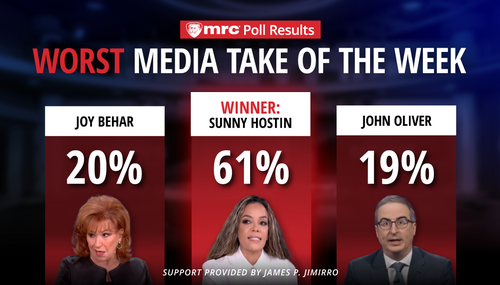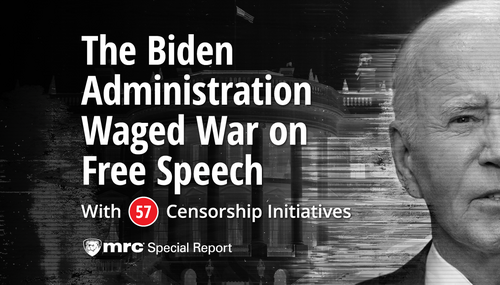In an interview posted on Wednesday, Hollywood Director Rob Reiner criticized Robert De Niro's profane, F-bomb Tony Awards speech aimed at President Donald Trump because such antics end up "helping Trump." (He didn't mention that the crowd's gleeful applause and Hollywood elitists' support on social media for De Niro's rant contributed mightily to "helping Trump.") On Howard Kurtz's Sunday Media Buzz show, Reiner demonstrated his obvious belief that any other direct or indirect criticism of Trump, no matter how unhinged or utterly divorced from reality — a long as it contains no profanity — is just fine.
Reiner criticized De Niro on the Rising program at The Hill hosted by Krystal Ball and Buck Sexton. Though the program was posted on Wednesday, it appears to have been recorded before Trump responded to De Niro's tirade early Wednesday morning.
The headline at The Hill's Saturday online story contends that Reiner "denounced" De Niro and other celebrities for their "anti-Trump remarks. That's not true; the video segment shows that he only denounced their use of profanity in doing so.
Reiner also promoted a common, media-driven misreading of the state of the American electorate:
Transcript:
BUCK SEXTON: On the "What's acceptable discourse?" from folks out there with pretty big platforms, what do you think of, most recently - we could also take about Samantha Bee with Ivanka Trump - but with the comments by Robert De Niro at the Tony Awards, it seems to me just unhelpful, at a minimum.
ROB REINER: No-no, at a maximum. At a maximum. It's not - Here's the thing. He's allowed to have whatever opinion. He doesn't like Trump, you can do whatever you want. But if you have any interest in trying to preserve the democracy, and put it in the hands of somebody who understands government, who isn't self-dealing, who cares about this country and the people in this country, they you don't - Then you're helping Trump. You're helping Trump by saying, you know, "F Trump."
KRYSTAL BALL: Why is that?
REINER: Because, he can say, "Look at these people, these" -
BALL: Elites.
REINER: "Elitists and Tony" -
SEXTON: Yeah. Pretty compelling statement from the President in response to that, if he were to make it.
REINER: That's what I'm saying. So that doesn't help. If you goal is to - now, in every election, you want to energize the base and you do certain things to energize the base. But you - there's a very fine line between energizing the base and energizing the other side.
Right now, if you're a Democrat, and you want to hold this president accountable, you have to have some ability, some subpoena power, to have hearings and actually expose certain things.
You're not - Right now, you've got an enthusiasm gap. You know, Democrats are excited, they want - you know, talk about the blue wave. But if you do things like that, that enthusiasm gap narrows, because you make the other side more enthusiastic -
BALL: You've excited the other side.
REINER: And so it's not good.
4-1/2 months is a lifetime in politics, but Reiner's contention about the current state of the alleged "blue wave" coming in November is highly suspect. According to a Thursday column by David Winston, an election analyst at CBS News:
For all practical purposes, the so-called enthusiasm gap between the party bases has disappeared.
Results in primaries in Ohio in May in Reiner's home state of California two weeks ago support that contention.
But the blue wave is Reiner's story and he's sticking to it. The Rising hosts should have challenged his contention, and didn't.
In his Sunday interview with Fox's Kurtz, Reiner decided to go further with his belief that Russian attempts to influence the 2016 presidential election represented greatest attack on American democracy since 1941.
Now he says it was worse than 1941:
Transcript:
HOWARD KURTZ: After the election, you called the outcome the greatest attack on this democracy since 1941. I was kind of stunned by that, because you're comparing the lawful election of a candidate who won the Electoral College to the Japanese sneak attack on Pearl Harbor. Now that you're older and wiser, was that going a little too far, maybe you were feeling overwrought at the time?
ROB REINER: No. No actually, I feel a little bit more - I think I not only agree with that, but I would go even further. Because we are not talking about - when we start looking at what happened to America, people have to really understand this. And this is one of the most of difficult parts of understanding the Russians.
KURTZ: But we had an election.
REINER: No-no, I understand that.
KURTZ: You're comparing it to 2,000 Americans being killed at Pearl Harbor.
REINER: I’m not talking about the election that we have and electing Donald Trump. I'm not talking about that. What I’m talking about, and it’s really important to understand this, because this is the key to us here. We're talking about a foreign enemy power influencing an election. In the world of cyber warfare, it is insidious, and we don’t necessarily feel it. We do know the capacity. We are learning the capacity, not just from a disinformation campaign or active measures, which the Soviets and Russians now have been doing it forever.
KURTZ: But just to clarify, your comments are aimed more at the Russians, and the meddling, the undeniable meddling in the election?
REINER: Yeah. Yes.
KURTZ: I'm glad we clarified that.
Since 1941 had no presidential election, the "clarification" Kurtz believes he got from Reiner means nothing. The attack on America which took place in 1941 was Pearl Harbor. "The outcome" referred to in Kurtz's opening question to which Reiner objects is Donald Trump's election victory. We wouldn't be hearing a peep out of Reiner if Hillary Clinton had won.
If Reiner thinks profanity-free rhetoric like his is helpful, he might consider what happened to Mrs. Clinton when she called half of Donald Trump's supporters "deplorables." As I noted in December 2016, a Clinton campaign consultant tracking undecided Pennsylvania voters found that "the conversation shifted the most" towards favoring Trump after that remark. "All hell broke loose" once her tracked voters saw Clinton as "the biggest bully of them all."
That, contrary to the flawed polling published up to and including Election Day, is what turned the tide in the so-called "blue wall" and other states Hillary Clinton narrowly lost.
Cross-posted at BizzyBlog.com.






